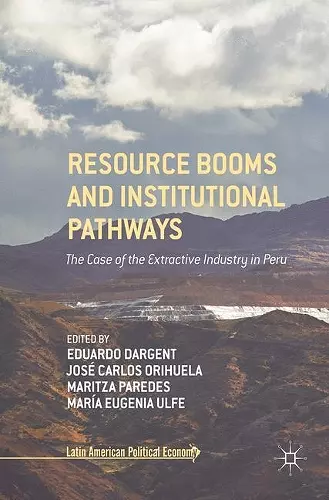Resource Booms and Institutional Pathways
The Case of the Extractive Industry in Peru
Eduardo Dargent editor José Carlos Orihuela editor Maritza Paredes editor María Eugenia Ulfe editor
Format:Hardback
Publisher:Springer International Publishing AG
Published:26th Jul '17
Currently unavailable, and unfortunately no date known when it will be back

"This book makes a bold and timely contribution to the literature on natural resource wealth, much of which has emphasized the negative impact of wealth on institutional strength. In contrast, the authors of this important new book offer a more nuanced and fine-grained understanding of the relationship between resource extraction and institutional evolution. They do this by focusing on one particularly salient case, that of Peru, and by bringing to bear their expertise on a range of specific institutional arenas that were impacted by the recent mining boom - including revenue sharing rules, environmental regulation, and conflict management. Thus, a distinctive strength of this volume is that it asks similar theoretical questions about institutional development across numerous institutional landscapes, but all in the same country and in the same critical time period. This research design enables the book to advance a number of persuasive arguments about the design of institutions, the relative strength of institutions, and the timing of institutional change." (Kent Eaton, Professor of Politics, University of California Santa Cruz, USA) "Abundant natural resources are a well-known curse on development and democracy-but this thought-provoking book tells us they do not have to be. Using intensive and well-chosen Peruvian case studies that range from university research funds to environmental impact assessment and conflict management, the authors show that new institutions can be created and go on to thrive even in the high pressure situation of an extractive commodity boom. If and when they do depends on patterns of state-society relations and the entrepreneurship of embedded individuals, an explanatory framework that looks very promising for extension to additional Latin American cases." (Kathryn Hochstetler, Professor of Environment and Development, London School of Economics and Political Science, UK)
This book analyses the institutional development that the Peruvian state has undergone in recent years within a context of rapid extractive industry expansion. It addresses the most important institutional state transformations produced directly by natural resources growth.
This book analyses the institutional development that the Peruvian state has undergone in recent years within a context of rapid extractive industry expansion. It addresses the most important institutional state transformations produced directly by natural resources growth. This includes the construction of a redistributive law with the mining canon; the creation of a research canon for public universities; the development of new institutions for environmental regulation; the legitimation of state involvement in the function of prevention and management of conflicts; and the institutionalization and dissemination of practices of participation and local consultation.
ISBN: 9783319535319
Dimensions: unknown
Weight: 3947g
206 pages
1st ed. 2017